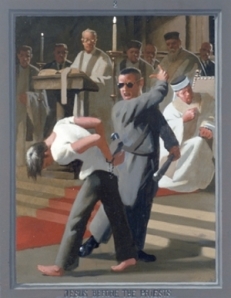
Jesus Before the Priests from The Passion of Christ: A Gay Vision by F. Douglas Blanchard
by Kate Henley Averett
Were you there when they crucified my Lord?
It’s Good Friday, I’m 11 or 12, perhaps. I love this day, not just because we get it off from school, but because there is just something so different about Holy Week, Friday being the strangest and most disorienting of them all. I know there must be something special about it if it’s the only day of the entire year that nobody celebrates Mass. As usual, I’m confused, and made somewhat uncomfortable, by the ritual of venerating the cross. We process forward and take turns kissing the wood, something that feels like it should be private yet is performed in public, sanctioned and affirmed by the assembly; some of the women are visibly crying. There’s almost a cultural disconnect – such open displays of emotion have been rare in my stoic Massachusetts upbringing. We sing this hymn, slowly and mournfully, that I love. Were you there when they crucified my Lord? It’s beautiful, but confusing too – of course I wasn’t there, and neither were any of these people who I watch kiss the cross my own lips had brushed moments earlier. But the women crying – do they understand somehow, what it was like to be there? I try to imagine the scene, to put myself there, to watch them crucify my Lord, nail him to the tree, lay him in the tomb, but it’s so hard to imagine. Still, as the song swells, waves of emotion I don’t fully understand break over me.
Were you there when they crucified my Lord?
My feet are aching as we stand for the long, long Gospel reading. I just walked 13 miles with other high schoolers in the youth group at the Greater Lowell Walk for Hunger, and I’ve got blisters and sore, swollen feet. I shift uncomfortably from foot to foot as I struggle to follow along in the Missalette so I know when to chime in with the rest of the congregation, playing the part of the crowd. “Release Barrabas,” we say, “We have no king but Caesar.” And then the part I hate: “Crucify him! Crucify him!” Why do they make us say that? And why do some people say it so enthusiastically? We don’t want to see Jesus suffer, do we? We aren’t like those people in the crowd, right? And then it hits me – statistically speaking, anyway, if we’d been there, most of us would’ve been in the crowd. The way the story’s told there were only a handful of people who were supporting Jesus, and we couldn’t all be in that small group of women. Every year when we sing that hymn and I try to imagine being there, I’ve always seen it from a distance, like I’m watching a film. But if I’d really been there when they crucified my Lord, where would I have been? Would I have been in the crowd of people, shouting for him to be crucified?
Oh, sometimes it causes me to tremble, tremble, tremble.
Holy Week is rapidly approaching and the seven of us, students in HDS 2984: Passion Play: History, Theology and Performance, are working frantically to get our play together in time. It’s a different sort of play – non-linear, with shifting characters and perspectives – and we’re making it intentionally uncomfortable and disorienting for ourselves and our audience. There are moments in several of the scenes where I’m really working to embody Jesus as he’s presented in Mark’s Gospel. I chose Mark specifically because of how physical his descriptions of Jesus’ last days are – there are moments when I’m reading, especially about Gethsemane, when I know – really know, in my body – what Mark’s Jesus is going through, because the anxiety, the fear, the hurt and betrayal, I’ve felt it before, too. During Holy Week, as we perform, and there are moments when I’m overcome and I begin to tremble, even to cry. The question, “Were you there?” takes on new meaning as I place myself in a different “there” in the story – the “there” of Jesus’ experience.
Continue reading →
Filed under: Good Friday, Kate Henley Averett | Tagged: catholicity, contemporary crucifixion, Good Friday, Gustavo Gutierrez, hate crime, Jon Sobrino, Lawrence King, liberation theology | 3 Comments »






